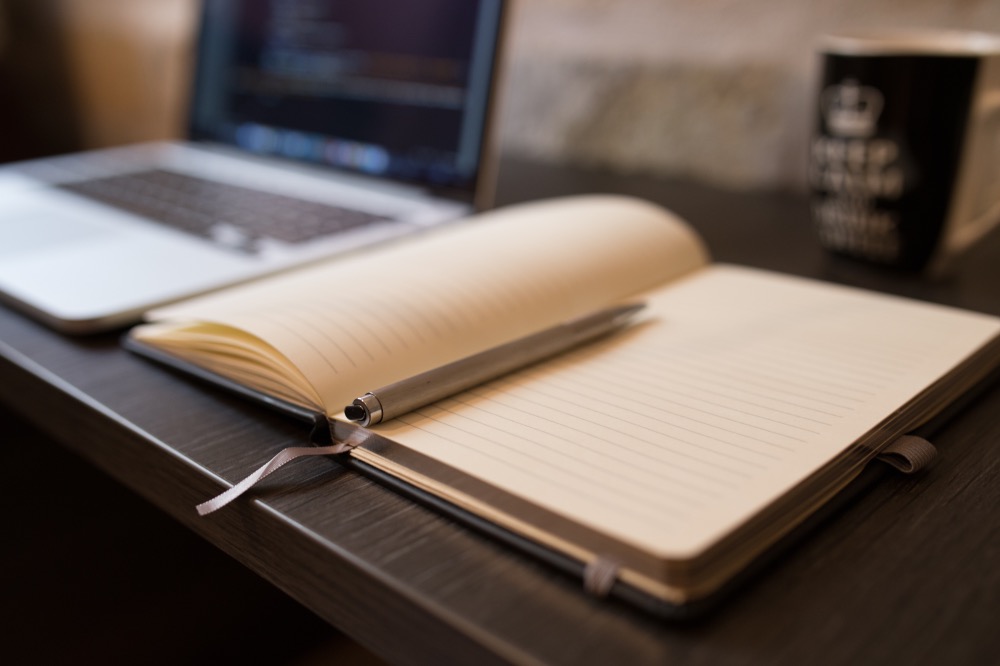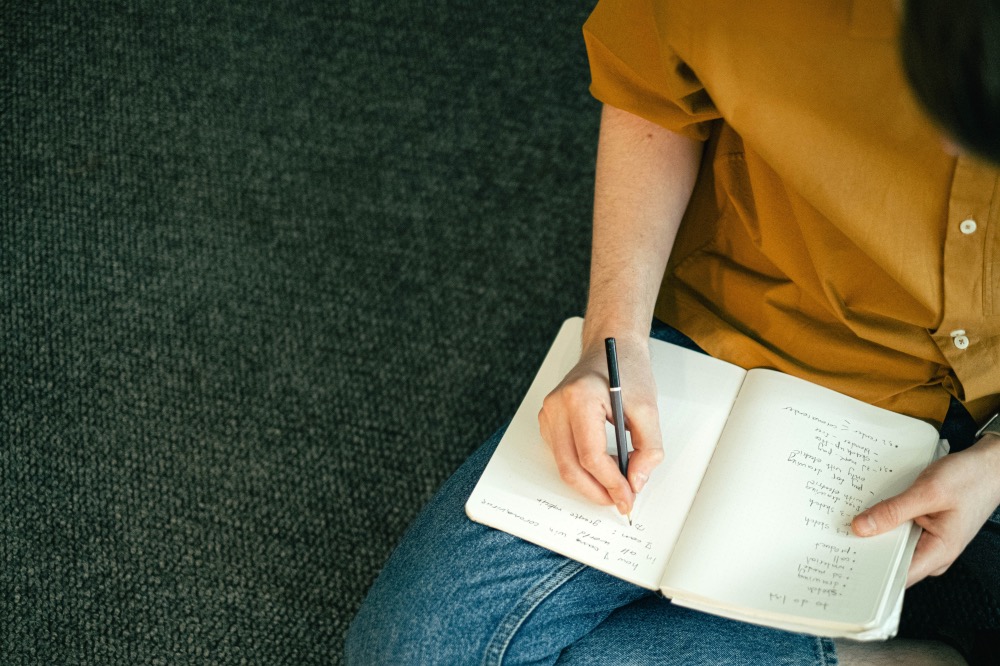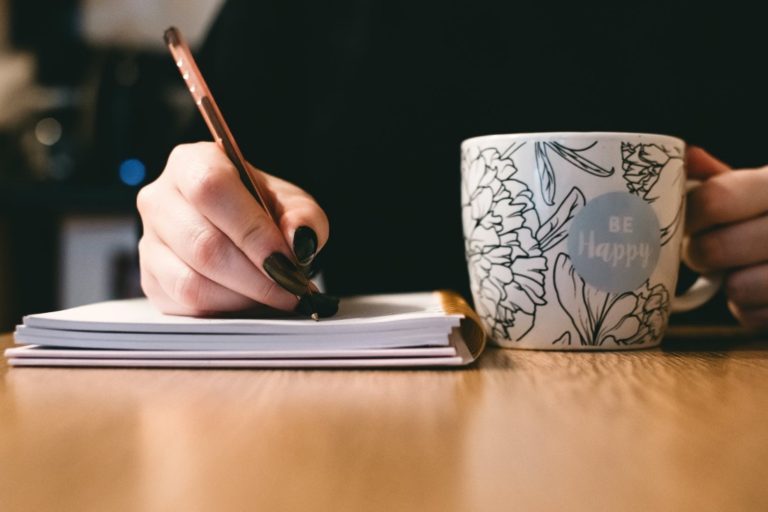
There’s something about a blank page that has magic to it!
Regardless of how you interpret your process for writing, world-building, or story-building, all stories begin with a set of ideas; images, sounds, emotions, sensations, atmospheres, settings, characters.
Where do they come from? How do you capture them? Do you keep those ideas in your brain throughout the day and just hope that it’ll be there when you start to write or note them down later on? Do you brush them off, figuring if they were important enough, you’d remember them anyhow? Or, do you immediately find a place to write them down, capturing them before they fade away?
You could let them go. Perhaps they’re not important to the story you’re trying to tell.
I’m of the school that any idea that pops out at you under the right conditions is significant enough to tell a story with. So why not write it down?
A Tool for Noticing the World
The truth is, every moment is an opportunity to realize something you weren’t aware of previously. One moment you’re walking towards a cafe, when you notice something that grabs your attention.
- A person wearing a strange outfit, looking like they’re from another world!
- Music blasting from someones car speaker, your ear grabbing just a few words that stick with you the rest of the day.
- The crash of thunder, and a spasm of lightning in the sky, and what it felt like standing on the ground.
- Deep thoughts of something that happened earlier in the day, and a flash of emotion it creates in you.
- And so on, and so forth!
Inspiration comes from all over. Things you see, hear, sense, think, or feel. … The magic that a pencil and notebook has can give you the ability to capture them!
Getting Used to the Habit
I have to emphasize that the recording of ideas, while it is technically writing, it’s not the same as sitting your butt on the chair and haming out actual sentences, paragraphs, prose. I’m talking about the bits that come when you’re not expecting them. Free floating thoughts!
At first, the idea of bringing a notebook with you wherever you go is cumbersome. I used to carry a small notebook the side of my palm in my back pocket. While it was there for many keen moments, it started falling apart from use.
What I did record, I kept and recorded on my laptop later in the day. … Sometimes, I record ideas using my phone either with text, voice-to-text, or just voice recordings. Perhaps I get to the cafe, and immediately take out my laptop and start recording them. Your options are plentiful!
….
But real talk! … If you know me, I won’t just stop at “nudging you”.
To be honest, I decided to go overboard with this article, because I know that what you REALLY want is data! Justification! Some reasons to sink your teeth into!

1) Recording the Idea for its Own Sake
The main benefit is the simplest one! … When you write down your thoughts some place, you have them recorded in a place that isn’t just your mind. It lives on paper, or digital screen. You have the unique benefit of going back to those notes, and bringing those ideas back so that you can work with them.
Most of us have lives that are busy. We may be attending school, or working a day job, taking care of a family, hanging out with friends, practicing a talent outside of writing, participating in extracurricular activities or business. Our minds are chaotic. It is not a nice-and-neat bank vault of ideas, but a messy bedroom with clothes everywhere. Sometimes, a thrashed warehouse.
The brain is a wonderful organ, but it falls to the gutter when we’re not paying close enough attention. What about the feeling? Something about the idea I had is missing? Why didn’t I write it down? Sadly, those brilliant skylines built upon bricks of story ideas often become urban decay and piles of rubble when you don’t capture them.
2) Writing It Down Encourages Long-Term Memory
If you remember your days in school (or are living them now), you know the drudgery of note-taking for tests and exams. Teachers always encourage you to take notes. Part of you wants to doze off and wait for class to get out. However, somewhere over continuous practice, you know that taking those notes is far better than not having them when you need them.
Yet, over time, you realize something interesting. The very act of writing down notes recites those facts back to you, reinforcing them in your long term memory. Likewise, doing the same for writing ideas can actually help you retain that information for a longer period of time, so even if you can’t go into deep detail now, getting something down will help you recover it later.
3) Your Brain Has A Sensory Network. Use It!
Several neuroscientific studies have shown that the brain is divided into multiple regions that process different kinds of information. Eyes take in sight. Ears take in sound. Mouth speaks words. Body feels numerous emotions. … Each of these senses work in tandem with each other, but also have to work independently. Therefore, many ideas simply become free-floaters with no grounding, It takes more than just thought to make concrete connections between these parts of the brain.
When you record your idea, something happens. New pathways connect. These separated parts of your brain now have highways that bridge between them, and the full idea takes form.
Writing great stories often requires an attention to the senses of the character, or the feeling of a scene, or atmosphere of a setting. Say it outlaid as you write. Describe the sight. Articulate the sound. The better you can describe those aspects in your notes, the more fleshed out that idea becomes.
4) The Science of Handwriting vs. Typing
Now heres an interesting choice.
Do you record your ideas using a pen-and-paper notebook, or do you record them with a phone, or perhaps a laptop?
All of these methods work. Neither of them are the same. A study by two professors from Princeton University and University of California respectively compared the performance of students using either laptops or notebooks, specific to an in-class note-taking environment. They noticed that those who wrote their notes by hand remembered them more readily than those who used laptops.
Granted, this is offset by the technological advantage of a laptop or phone, and that is the speed of the note-taking. Those with laptops typically record more content, and faster.
The reason I bring this up (despite being about note-taking) is because there are definite trade-offs with one method or another. If you are in a circumstance where you have only one to use, this decision doesn’t play into that. However, if you have plenty of time and choice in the matter, its good to be familiar with what each of these methods will help you accomplish when capturing that floating idea!
5) Opportunity to Take Down Visuals, Not Just Words
So it begs the question,… how do you take notes? Words only?
Or perhaps you fancy yourself a sketch artist, or someone who wants to get more than just letters on a page?
When dealing with writing and story ideas, sometimes taking down a visual can help flesh out more complex ideas. Perhaps you imagine a room, and need to depict where certain things are in that room. Or a monument in the center of a grand city, roughly sketching its shape. … Maybe you need to know the standing positions of your key characters when they witness a murder, even if its just stick figures. A tree of the royal family line. A diagram comparing two nations between each other. A quickly drawn timeline of events.
All of these things benefit from visuals!
See if you can figure out a way to accomplish it using some quick line-work.
6) The Art of "Idea Recall"
This one is more esoteric, but let me paint a picture for you and see if you can compare:
You drift off to sleep one night after a long day of work. Fragments of thoughts and images float past your weary mind, and begin twist and converge into a vivid hallucination. Suspended in a bizarre world of mirrors, impressions take form as sight, sound, sensation, emotion. An arrangement of psychic theatre, familiar yet foreign.
You are jolted awake, the sound of your pet knocking over something in the kitchen. Eyes are groggy as you feel the discomfort of being ejected from this world, but moments pass.
There are gaps in your memory. What were you dreaming of? What was that feeling you had? Did you even have a dream?
Many people identify with this experience of dreaming. How easy it is to remember something immediately after waking abruptly, yet forget about it moments after. What does this have to do with writing, or jotting down writing ideas in a notebook?
One word. ... Recall!
According to Deirdre Barrett, psychologist at Harvard Medical School and author of “The Committee of Sleep”, dreams are difficult to recall, depending on what sleep phase you wake up at. However, your ability to recall dreams can be improved through a handful of different mental exercises, the most prominent is the keeping of a “dream journal”.
The act of recording your dream just as soon as you wake up and have it in memory enhances your minds ability to not only bring back details from that dream, but recreating those impressions when you read them back to yourself.
In fact, some have attested in their own experience with the exercise that this can improve your overall recall of dreams going forward (for as long as you keep up the practice).
My theory (and observation) is that this works the same way when recording writing ideas in a notebook when wakeful! … Not capturing ideas can be a subconscious habit which can leave you feeling like you have no ideas to capture, when in fact, you’re simply not recognizing them when they happen. So, why not use that notebook to work on your recall?
When you are in the practice of writing down ideas as they come to you, you encourage your mind to better identify consciously when an idea begs to be written down.
7) Don’t Overthink It. Capture it. In any form.
Leaving this one for last.
I’ve drilled the same idea into your brain for the past few segments, giving a different take on why its useful, but in reality, that’s all extra.
What matters for the most part is that you are taking the ideas you can, and putting them somewhere you can work on them. If you only have a scrap of paper, use it. Can’t find a pen? Type it quick in your phone. If you don’t have it available, even as little as saying the idea outloud to yourself and telling yourself “Remember this idea” is better than letting an idea slip by.
Granted, you won’t catch all of them. You’d go crazy trying!
What matters most is the effort. It’s perhaps 90% of the overall process. The rest is up to you how you want to capture it.

To Notebook,... or NOT to Notebook?
Now, I get. This might not be for everyone.
Stephen King is known for saying “Notebooks are where good ideas go to die”.
Not every idea is a good idea. Groucho Marx the comedian once said “What? they can’t all be funny. You’re going to have to expect that”.
At the end of the day, some things fit the mold, and others don’t … Yet, none of this should prevent you from writing them down! … You might never know the value of an idea until later.
If it’s relevant to your stimuli, and seems like an interesting story element, write it down.
Even if it has nothing to do with the project you want to do, because you … will… never … know if that thing might become a cornerstone to a future project, or an event in your current one.
When you’re ready to put together your next piece of writing, won’t you be happy to know you have a selection of ideas to pull from?
If you enjoyed this article check out some of my other writing articles, such as:
- Discovering Your Writing Superpowers! (The Exercise of Writing)
- NaNoWriMo for Newbies!: Preparation and Managing Distractions
- Storybuilding: Save the Cat! Beat Sheet
- 25 Fantasy Writing Prompts and Story Ideas
IMAGE CREDITS: Vanya Samkov, Negative Space, Karolina Grabowska, Lisa Fotios
- Axolotls, Genies, and Kaiju; a Quick TTRPG Zine Roundup #2 - May 19, 2025
- d100 City Encounters and Urban Sidequests - April 26, 2025
- Dirtbags! a Sci-Fi Shooter RPG: Gameplay Review! - March 23, 2025


